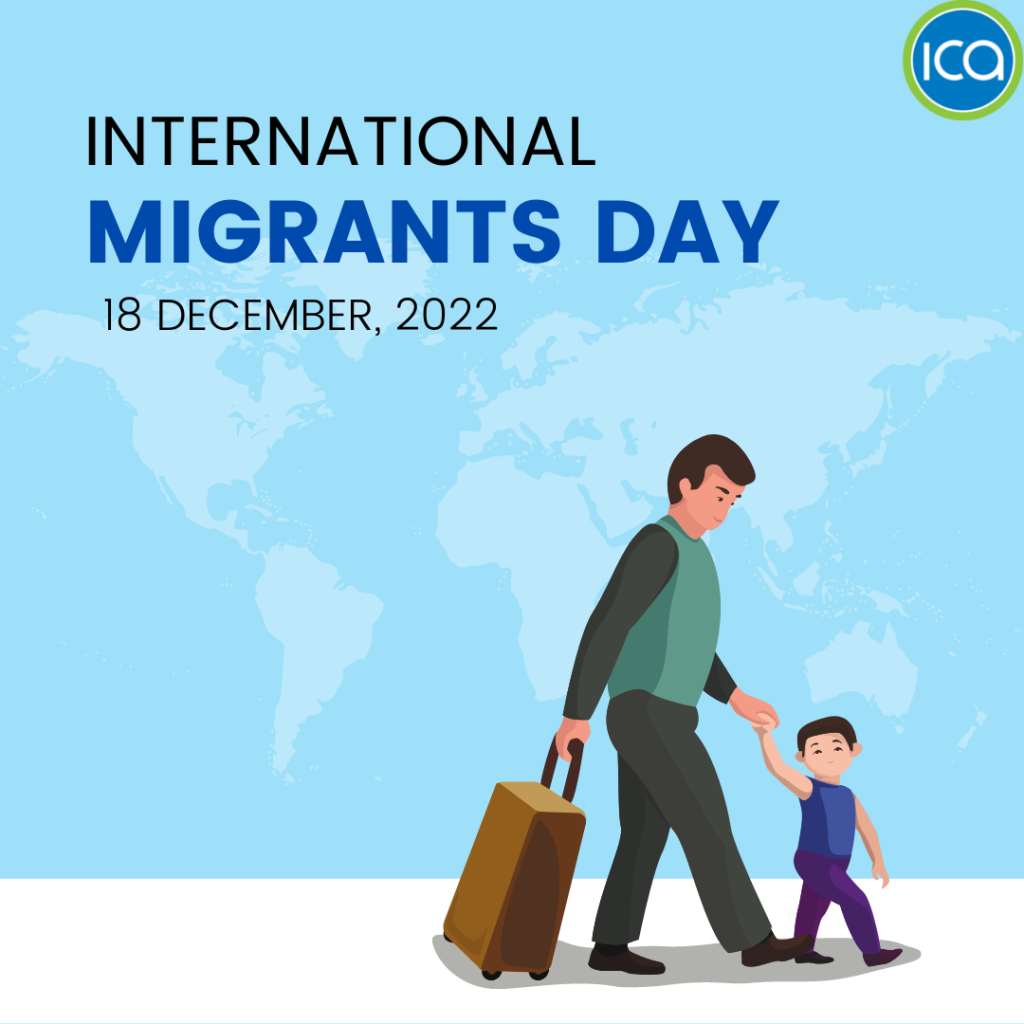International Migrants Day

Yesterday marked International Migrants Day. In recent years, conflict, insecurity, the effects of climate change have heavily contributed to forced migratory movement, whether within countries or across borders. In 2020 over 281 million people were international migrants, while over 59 million people were internally displaced by the end of 2021.
The ICA marks this day by sharing some key information on regular and non-regular migration in Ireland.
Definition
The term migrant is an umbrella term reflecting the common lay understanding of ‘a person who moves away from his or her place of usual residence, whether within a country or across an international border, temporarily or permanently, and for a variety of reasons’.
The term includes a number of well-defined legal categories of people, such as migrant workers; persons whose particular types of movements are legally defined, such as smuggled migrants; as well as those whose status or means of movement are not specifically defined under international law, such as international students.
Regular Migrants Situation in Ireland
Regular migration is defined as “migration that occurs through recognized, authorized channels” (IOM).
According to the latest data from 2020:
– Ireland received 43.000 new migrants on a long-term or permanent basis, 17.2% less compared to 2019.
– Out of 43.000 migrants, 61.3% of them benefitted from free mobility, 30.5% were labour migrants, 4.3% were family members (including accompanying family) and 3.8% were humanitarian migrants. – – Around 15.000 permits were issued to tertiary-level international students and 900 to temporary and seasonal labour migrants (excluding intra-EU migration).
– 8.200 intra-EU postings were recorded, a decrease of ‑52% compared to 2019.
Non-regular Migrants Situation in Ireland
Irregular migration is defined as the “movement of persons to a new place of residence or transit that takes place outside the regulatory norms of the sending, transit and receiving countries.” European Commission).
It is difficult to find some data about non-regular migrants entering Ireland.
However, focusing solely on asylum requests, data shows that in the first five months of 2022 almost 5,000 people have applied for asylum in Ireland. The figures, which do not include more than 36,000 Ukrainian refugees, have been described by the Department of Justice as “significant“.
Migrants and ICA
The mission of the Association are: to bring women, included migrant women, together in fellowship and through co-operative effort, to develop and improve the standard of rural and urban life in Ireland.
The ICA commitment to bring women together is inclusive of migrant women. Some significant examples are:
1. Millstreet Guild: The capacity of ICA Guilds in helping migrant women with their well-being and their social inclusion through cultural diversity has been demonstrated by the constitution of Millstreet ICA Guild. It is composed by 15 migrant women living in Direct Provisions and coming from Nigeria, Zimbabwe, Ukraine and Oman. After having been welcomed by ICA, they are now learning and teaching themselves crocheting, knitting and traditional skills. They are also planning to raise awareness in Millstreet about ICA and the importance of women support in the migration context.
2. Unity in Diversity Project: Funding for the project ‘ICA Unity in Diversity’ supported the increase participation in learning to women living in areas of need by providing an opportunity to create and access learning opportunities at local level aimed at the provision skills training and/or upskilling, supporting cultural exchange and inclusion, and covering the subject of handcrafts.
The ICA is aware of the challenges and the difficulties that, especially non-regular migrant women and their children, face. This is we ask for meaningful action from the Government:
– To better collaborate with the NGOs who everyday deal with migrants in order to better understand which the most urgent needs are.
– To guarantee migrants their human rights.
Organisations who help migrants in Ireland
Despite our commitment and mission to support on women, the ICA efforts are not focused on migration-related issues.
Consider supporting some of the organisations that specifically support migrants:
– Doras
– Abolish Direct Provision in Ireland
– Business in the Community
– Che P Grub
– Immigrant Council of Ireland
– Irish Refugee Council
– MASI
– Migrant Rights Centre
– NASC
– Ruhama
– Going far

